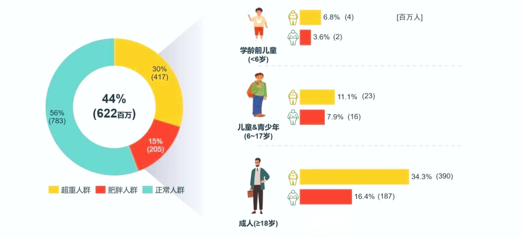
Is deep-sea fish oil rich in EPA and DHA a waste of money?
01Source of deep-sea fish oil
In the 1970s, researchers found that although the Greenland Inuit mainly ate fish, their cardiovascular disease incidence and mortality were very low. They further found that fish were rich in n-3 polyunsaturated fatty acids such as eicosapentaenoic acid (EPA) and docosahexaenoic acid (DHA), which help protect blood vessels and reduce the risk of cardiovascular disease, triggering a global research boom on the relationship between these fatty acids and health.
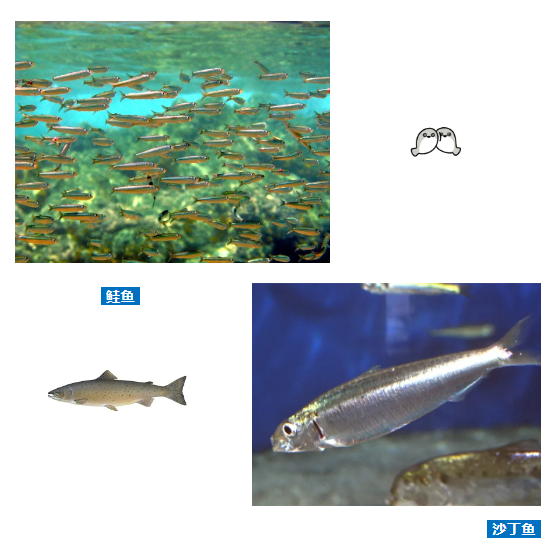
Deep-sea fish oil refers to the general term for all oil substances extracted from deep-sea fish animals. Its main components are polyunsaturated fatty acids (Omega-3), including EPA and DHA, which have multiple ketone groups and conjugated double bonds in their molecular chains. Although EPA and DHA are also found in ordinary fish, the content is extremely small. Deep-sea fish oil mainly comes from fish in the deep sea in cold areas, such as salmon, sardines, etc.。
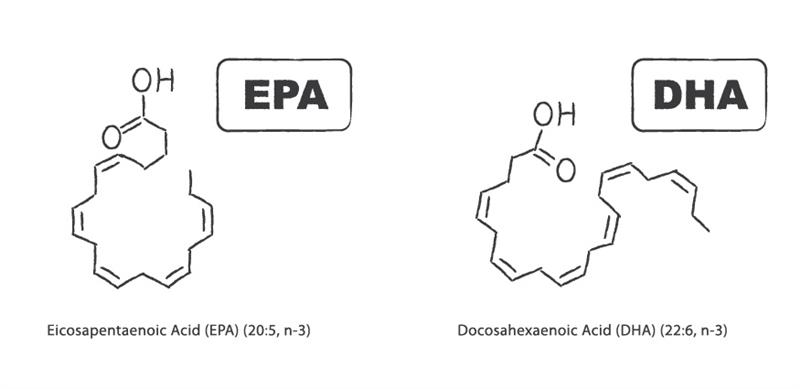
02 The benefits of deep sea fish oil
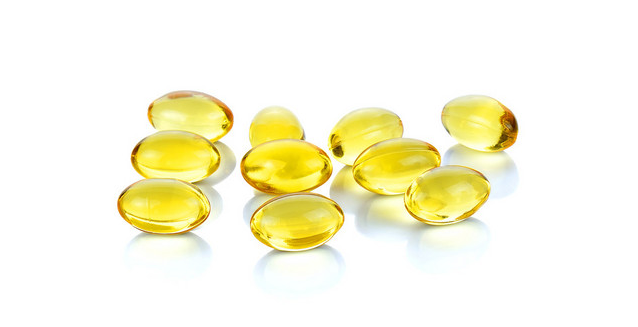
1. Regulate blood lipids: reduce the content of low-density lipoprotein, cholesterol and triglyceride in the blood, and increase the content of high-density lipoprotein.
2. Prevent cardiovascular and cerebrovascular diseases: Prevent atherosclerosis by reducing blood lipids, prevent platelet aggregation and reduce the probability of myocardial and cerebral infarction.
3. Brain health and intelligence: Rich DHA is an indispensable material basis for the formation, development and operation of brain cells, and promotes the development of brain cells. Students and office workers who overuse their brains can properly supplement deep-sea fish oil to enhance memory, concentrate attention and improve comprehension ability, while elderly people can supplement DHA to activate thinking and prevent Alzheimer's disease.
4. Improve immunity: Deep-sea fish oil can reduce the migration of white blood cells and monocytes, change the inflammatory process, and prevent infectious diseases and autoimmune diseases. DHA and EPA reduce the production of prostaglandin E2, enhance the immune system's monitoring and killing function of tumor cells, and improve the activity of immune cells.
5. Anti-inflammatory and disease prevention: EPA and DHA in deep-sea fish oil have anti-inflammatory effects, balance the excessive amount of Omega-6 fatty acids in the body, improve inflammation such as rheumatoid arthritis, and have auxiliary effects on asthma, psoriasis and diabetes.
6. Muscle building and body shaping: Omega-3 fatty acids in deep-sea fish oil increase the sensitivity of muscle cells to insulin and amino acids, promote protein synthesis, and have a significant muscle building effect. At the same time, they accelerate mitochondrial function, inhibit fat cell transformation and promote pre-adipocyte death, which helps to build muscle and shape the body.
7. Improve mood: Overtraining, staying up late, stress, etc. can lead to increased cortisol levels, and Omega-3 fatty acids in deep-sea fish oil can inhibit the activation of adrenaline caused by mental stress, allowing people to enter a resting state better and recover better after high-intensity training. In addition, studies have found that EPA and DHA are closely related to emotional balance. When the concentration of EPA and DHA in the blood is low, the chance of mild and moderate depression will increase significantly. Supplementing deep-sea fish oil can improve mood and make people more positive and optimistic when facing difficulties and pressure.
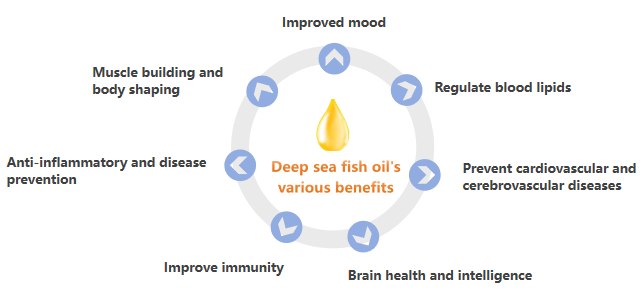
03 Is deep sea fish oil a waste of money?
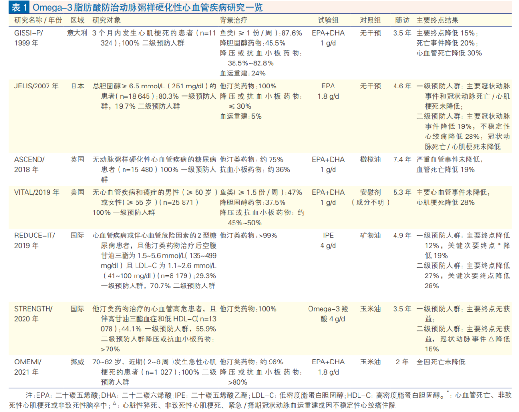
Strictly speaking, deep-sea fish oil is not a waste of money. As a health product rich in omega-3 fatty acids, deep-sea fish oil does have a certain health-care effect on ordinary middle-aged and elderly people and patients with cardiovascular and cerebrovascular diseases, and its effect has been rigorously scientifically verified (see table).
Deep-sea fish oil cannot replace statins, but if triglycerides are only slightly elevated and there is no sign of cardiovascular atherosclerosis, fish oil may not be a treatment option. For high-risk and very high-risk patients with atherosclerotic cardiovascular disease, if triglycerides are greater than 1.5 mmol/L (135 mg/dl), on the basis of strict lifestyle intervention and statin treatment, the use of large doses of omega-3 fatty acids 4g/day can further reduce cardiovascular risk.
In the study of the safety of deep-sea fish oil on the human body and its effect on lowering blood lipids, 120 volunteers who met the conditions were selected for human effect evaluation test and divided into a trial group and a control group. The trial group took deep-sea fish oil containing 44% EPA and 11.7% DHA for 60 consecutive days, 2.0 grams per day, and the control group took a placebo. Results The levels of total cholesterol (TC), triglycerides (TG) and low-density lipoprotein cholesterol (LDL-C) in the serum of the trial group decreased (P
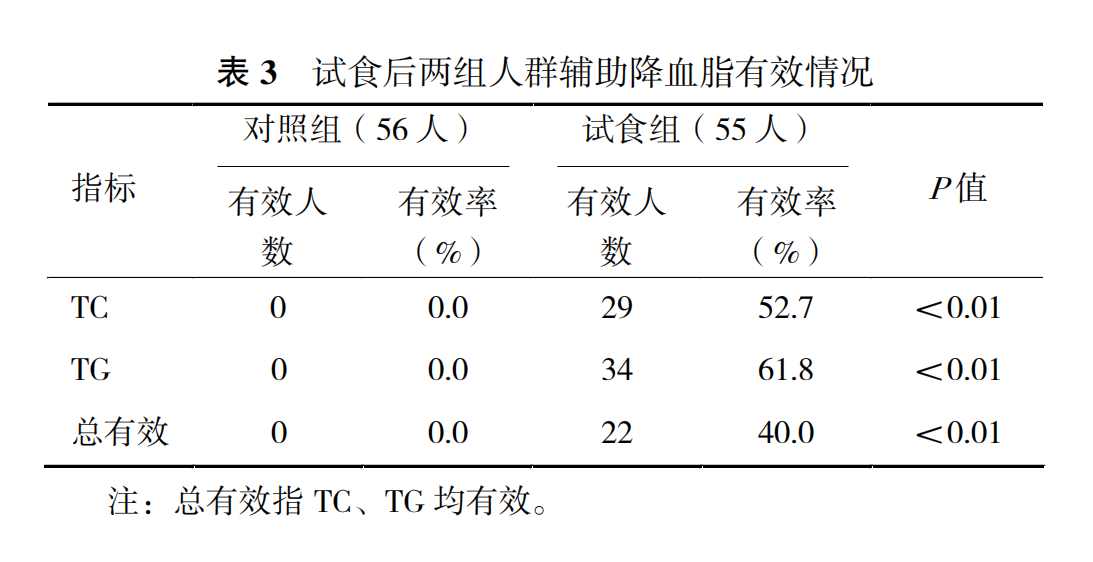

04 Choice of deep sea fish oil
There are many varieties of deep-sea fish oil health products sold on the market. When choosing, you should pay attention to the following points:

1. Look at the brand: Choose big brand products with the "little blue hat" logo.
2. Look at the purity: Choose Omega-3 purity of more than 80%, and try to choose fish oil with high EPA content. This high-purity deep-sea fish oil preparation has a clearer regulatory effect on triglycerides.
3. Look at the type: The most common fish oil on the market is ethyl ester (EE type) fish oil, which is generally considered to have an absorption rate of less than 70% and can cause hiccups, nausea and other problems. It is recommended to choose glyceride (TG type) or re-esterified glyceride (rTG type) fish oil, which is easier to absorb and less prone to hiccups.

4. Look at the certification: IFOS five-star certified fish oil should be preferred. Currently, the IFOS five-star certification is the most stringent international standard in terms of safety, pollutants, heavy metals, oxidative stability and bioefficacy.
05 Usage of deep sea fish oil
1. The dosage should not exceed 3 grams per day. (Taking too much dosage per day may increase the risk of nosebleeds or hematuria.)
2. Do not bite the capsule when taking it, and take it with warm water. (Because fish oil has a slight fishy smell, capsules are used to reduce this smell)
3. It can be taken with meals or with warm water 1 hour after meals. (It can avoid stomach discomfort caused by taking it on an empty stomach)

[1]吃深海鱼油,是不是在交智商税?医生说……广东卫生信息
[2]李彬,彭亮等,深海鱼油对人体安全性及降血脂作用研究





